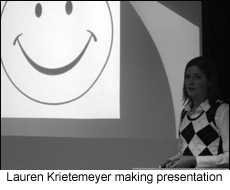
Robert M. Dunn has been receiving the kind of feedback from former students that would thrill any professor.p.
For example, 2003 chemical engineering graduate Nik Larsen wrote Dunn about the successes hed been experiencing at Marathon Oil, having taken the Integrated Engineering and Business Practices sequence that Dunn directs for the College of Engineering.p.
Larsen told Dunn howat all of 23 or 24 years oldhe had been able to analyze the corporations financial measurements and relate them to his unit and their work. The new kid on the block was teaching the veterans about the kinds of business decisions and planning they might undertake in the context of the larger corporate perspective.p.
He said his peers themselves didnt understand what he was doing. They were impressed with his explanations,says Dunn. Larsens former classmate, Chris Rayment, is making a similarly good impression at Ingersoll-Rand.p.
Larsen and Rayment learned these analytical skills in the two-course program Dunn introduced in the College of Engineering three years ago. Some engineering schools have begun to create combined engineering and business programs, but few undergraduate programs will offer business studies across all engineering disciplines. Here at Notre Dame, the courses have become so popular with students that a second full-time position was instituted last fall. John M. Brauer, associate program director, joined the faculty, as Dunn did, after a lengthy career at IBM. Right now, 55 percent of engineering undergraduates take the first course and one-third take the second.p.
Dunn himself learned business skills from what is commonly referred to as the School of Hard Knocks. He was graduated from Notre Dame with a bachelors degree in engineering science in 1965, earned a masters degree in engineering mechanics from Pennsylvania State University in 1967 and a doctorate in aeronautical engineering from the University of Illinois in 1972. He worked at IBM for 33 years, climbing the ranks from design engineer to vice president and site manager of IBMs Poughkeepsie, N.Y., complex, a facility composed of 15 major divisions and 6,000 employees. He also managed the development of a multidivisional unit in Dublin, Ireland, from green field site to operational facility.p.
Over that period, he gained expertise in product and technology development, manufacturing, human resources and management. Of his self-taught business savvy, he says,I learned through on-the-job training, making mistakes, or by watching what happened when others around me made mistakes.p.
Todays environment is so much more competitive. Companies dont have the time to help young people get started the way they used to.p.
As he began his fourth decade with IBM, Dunn says he thought he would work in the corporate world for a few more years. But a friend who also serves on the engineering advisory board told him of this new teaching direction Notre Dame was ready to undertake. Faculty, the college administration and the advisory board all believed that undergraduate coursework in business basics was essential for students who would take jobs in the corporate culture. (This sequence is not seen as essential to students who plan to do research or work for the military.) They had outlined a program and were searching for a director.p.
Over two courses, the business practices program helps engineering students develop an understanding of the dynamics of corporate operations, and the kinds of managerial and technical leadership roles needed in the corporate environment.p.
Integrated Engineering and Business Fundamentals, the first course in the sequence, focuses on four subject areas: the corporation and its financial processes; human resources and management; innovation processes, including project management; and supply chain processes and quality. Students learn how to read financial reports, and they study business planning cycles as they review corporations and their financial processes. They examine managerial styles and organizational climates and discuss human resources hiring trends.p.
Product development, marketing, and life cycle management are among the topics covered in the innovation processes segment of the course. The supply chain section covers topics from manufacturing and procurement to distribution, flow of materials, and quality concepts.p.
During the second course, Advanced Topics in Integrated Engineering and Business, students learn about globalization, outsourcing, and the creation of business plans. Case studies and special projects offer them opportunities to study the successes and failures of others. A simulation exercise organizes students in teams around a software program called CAPSIM that allows them to experience the dynamic interactions of a companys operations.p.
It would be no surprise to learn that, in his years at IBM, Dunn was something of an efficiency expert. In his quest to expose students to numerous experiences in a very short period, he assigns the classic books of business leadership to individual students, who must present the core concepts in a formal presentation to their classmates.This is not a speech class,he says,but I found engineering students dont get that many opportunities to make presentations.p.
Dunns students have a keen sense of how different these courses are from the usual engineering curriculum. Amy Eischen says she would have been taking environmental microbiology had she not been in the Advanced Topics course. On a Friday near the end of the spring semester, she and fellow classmates listened as Lauren Krietemeyer provided a 20-minute distillation of the key points of the business classicHow to Win Friends and Influence People.p.
Says their classmate Joseph Saliba,This might seem easier in terms of curriculum. But this is preparing me for so much an MBA, for example.p.
Showing the same poise as she had in her animated PowerPoint presentation, Krietemeyer adds,This class provides a lot of hands-on experience. Its a good way to learn.p.
Dunn and Brauer are considering changes to the overall curriculum. Its time, Dunn says, to add a focus on entrepreneurship. By virtue of their training, engineers can bring technical and problem-solving skills to a wide range of industries.p.
The challenge,Dunn says,is learning how to best apply those skills.p.
Gail Hinchion Mancini is editor of ND Works; Nina Welding is an associate editor in the College of Engineering.TopicID: 5381